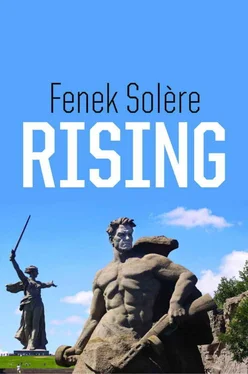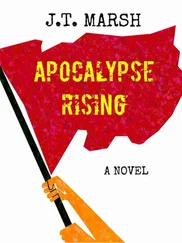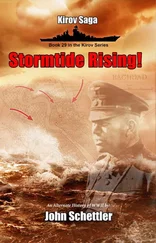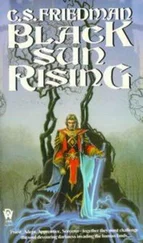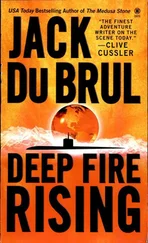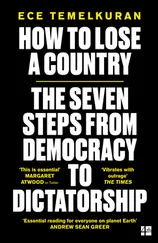He woke with a telephone ringing near his ear. A thin digital pulse cut the dead black air. Fumbling for the bedside lamp, Tom eventually found the light switch. A woman’s arm lolled over his thigh. His eyes squinted at the alarm clock. It was 03.20. He picked up the receiver.
‘Hello’, he rasped.
‘This is reception’, a woman replied. ‘I have a call for you.’
‘Are you sure?’
‘Yes, I am sure.’
‘I’m not expecting a call.’
‘They insist, sir!’
‘Ok, put them through’, Tom grumbled, dry-mouthed, failing to mask his frustration.
‘Hello’, came Grigori’s voice down a crackling line. ‘Did you enjoy my little entertainment?’
‘Entertainment?’
‘The girls?’
‘Yes, but how…’
‘I arranged with the driver in advance…’
‘Well, they are very beautiful…’ he went on awkwardly.
‘And friendly, no?’
‘Decidedly!’
‘They are recommended. I wanted to make sure…’
‘I’m grateful but also very tired’, Tom hinted.
‘I understand you very well, English’, Grigori guffawed. ‘Listen, I need you to go to the Peter and Paul Fortress tomorrow morning. You will meet one of my people in the tomb of the Tsars.’
‘Who?’ the Professor asked. ‘How will I know him?’
‘It is a woman, Iryna. She will find you. Go there at ten.’ The phone went dead. Tom cradled the receiver and rolled over on the pillow. A face shrouded in blonde hair emerged from the sheets to greet his lips. He heard the sound of a cellophane condom wrap popping.
‘Fuck?’ she asked.
Stand thou, O Peter’s citadel, like Russia steadfast and enduring…
—Pushkin
The city centre was bathed in storm-blue light. Radiating streets of equidistant nineteenth-century mansions were reflected in dull water. Stern terraces stretched away in austere straight lines as far as the eye could see.
Tom stepped off the kerb, joining the pedestrians moving cautiously to avoid a line of belching Lada taxis circling the square. To his right, the Cathedral dome was shrouded in cloud; to his left was the overbearing classicism of the Mariinsky Palace. He was pressed by people in long winter coats, jaws set hard against frosty daylight, resenting the imposition of the wage slave culture on the former proletarian people’s utopia.
Stopping for a moment, he watched bandy-legged Asiatics in skin-tight Levis point their cameras at the towering bronze of Nicholas the First, balancing uncomfortably on his galloping steed. The Emperor’s metallic form was slowly disappearing behind the haze falling across the façade of the St Petersburg City Council building.
The Professor’s eyes were drawn to the national flag tugging defiantly in a Baltic breeze. How different from 1917, when an armoured car flying a red pennant stood with its gun trained on St Isaac’s and revolutionary guards wielded bolt-action carbines behind makeshift barricades. The murder and savagery of those days was still etched in the streets. Nobody was immune, no family escaped a visit to the lime pit.
Walking under sparse trees, along yellow gravel paths forming trails beyond the great columned hulk of the Cathedral, he could see the sturdy haunches of the Bronze Horseman galloping towards the oily Bolshaya Neva. The river cut like a roiling charcoal snake between the Admiralty and the University embankments. Tom lingered, staring at the powerful figure set against the steely skyline. The sculptor had spent hours drawing horses in motion before the casting. There was, he thought, a certain irony that this very embodiment of speed and action should be so firmly embedded in solid stone. Yet another one of those contradictions that punctuated his walk along the riverside, where young drunks fell about in alcohol-induced stupors, whilst old men played chess or fished quietly from steps that descended in great waxen slabs to the water’s edge.
Across the river, the palaces, porcelain blue and egg-shell yellow, were being bombarded by streaks of bitter citrus sunlight. The spire of the Peter and Paul fortress was a golden spear, pointing far into the sky beyond the Dvortsovy Most Bridge. He crossed over the Neva with the gargantuan Hermitage Museum looming over his hunched shoulders. Blind windows stared vacantly outward, following his every move. Inside, gigantic rooms filled with amber, gold, and emeralds gathered dust. Endless corridors were stacked with spectacular artwork. Now Tom’s imagination was racing. He was simultaneously scared and excited to see more and more of this fairy tale of obelisks and gemstones, with all its fading grandeur and glistening steeples.
The sea wind picked up when he was midway over the bridge. A passenger ferry passed below, its engine pumping, wafts of burnt diesel pushing up through the blackened metal grating at his feet. Commuters swung briefcases and handbags. He was caught in a maelstrom of flapping ties and flailing scarves. Ahead, he could see a crowd of protesters gathering under the huge phallic columns of the Strelka Vasilevskogo.
Tom let the office workers pass, watching a gap-toothed Nikita Khrushchev lookalike pitch his stall at the base of one of the big rostral columns. The erstwhile tradesman was wearing a shabby army coat and a woollen hat with hammer-and-sickle insignia. The Professor doubted he was a genuine veteran. Stubby, fat fingers tumbled dice. Rouble notes were exchanged across a weather-beaten table. Looking over his left shoulder, back towards the north bank, he caught sight of a huge bear pacing along the wide parapet above the river. A coiled chain dragged uneasily along the ground behind. It stood on stout hind legs, pawing the sky, its dull fur coat matted with a crust of dirt. It had staring onyx eyes, bayonet claws spreading out before its snorting snout.
Tom strolled over the Birzhevoy Most Bridge to the Petrograd side. He pushed against a stream of students rushing to the State University, their lecture rooms clustered in a honeycomb of antique architecture around the Menshikov Palace. Bright, happy faces were wrapped in coloured scarves, bags on shoulders, tossing butts in gutters, splashing through puddles in front of the Pushkin House. They stood in groups, passing iPods or magazines. Some single ones sat on a wall, legs dangling loosely, cat-calling their friends, laughing and jeering. It was a snapshot of European and American cities from the 1950s and ’60s: a homogenous demographic with no compromises to the pretence of multicultural chic. Inspired, the Englishman recalled Francis Parker Yockey’s idea that Bolshevism, once free of the Zionist yoke, could be used as a lever against Pan-Slavic nationalism. He promised to himself that he would re-read the philosopher’s The World in Flames the minute he returned home.
Moving on, he could see the walls of the Peter and Paul fortress in the distance, the edifice scrabbling like a lobster, labouring under the weight of its own shell down to the sandy river bank. It struck him as a sinister presence in the centre of Rastrelli’s neo-classical wedding cake. It was an impenetrable, unfathomable, and infamous geometrical maze at the heart of the city. Its dark vaults were home to the ghosts of generations of revolutionaries who had been hung on meat-hooks for their beliefs.
Crossing the ancient St John’s Bridge under St Peter’s Gate, where a two-headed eagle and a horseman slaying a dragon motif stood proud, he entered into the cold, hard belly of the place. To right and left, carvings of Bellona, goddess of war, and Minerva, goddess of wisdom, confronted him. Directly in front stood the Cathedral, with its vast spire pointing at the gathering clouds. Tom walked in the shadow of Trezzini’s Tower. The wind whipped the walls, rising and falling like a condemned man’s death rattle. The smell of the river was in his nostrils, a fetid infusion of oil on metal. He could almost see the spectral memories of ill-fated dissidents flicker and curve through the grey veil circling about the golden angel one hundred twenty metres above the citadel. The sound of shuffling feet and a sense of awed rapture greeted him as he pushed on a carved wooden door and stepped inside.
Читать дальше
